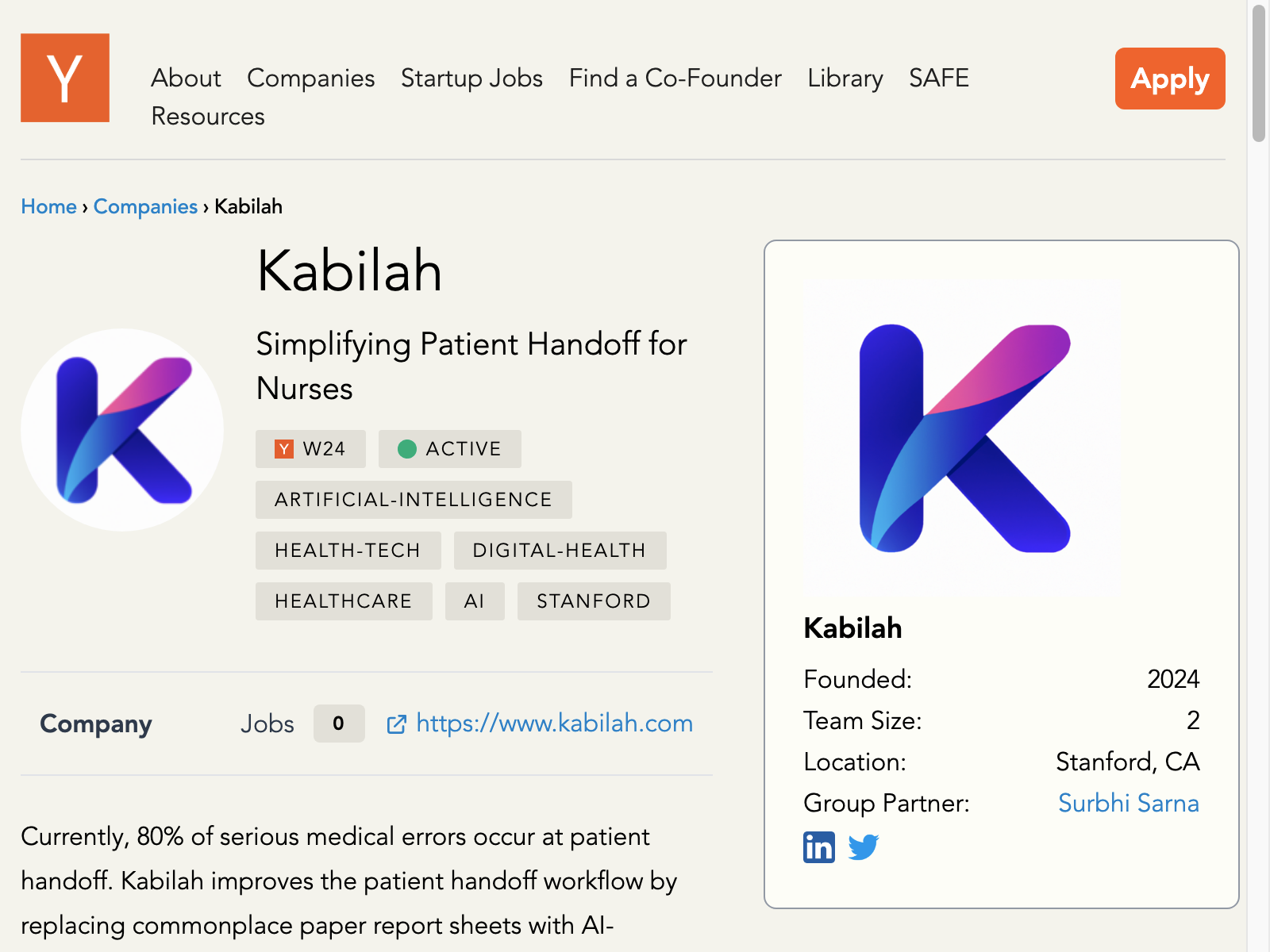Kabilah: Simplifying Patient Handoff for Nurses

Kabilah Overview
Kabilah is an innovative AI tool designed to revolutionize the patient handoff process for nurses. By replacing traditional paper report sheets with AI-powered advocates for each patient, Kabilah aims to improve efficiency and accuracy in the critical task of patient handoff.
In a detailed review, Kabilah stands out as a game-changer in the healthcare industry. The tool's seamless integration and intuitive interface make it a valuable asset for nurses, allowing them to concentrate on providing the best possible care for their patients. With its AI-driven features, Kabilah streamlines the handoff process, reducing the risk of communication breakdowns and ensuring essential patient information is accurately conveyed.
Kabilah Key Features
-
AI-Powered Patient Advocates: Kabilah creates a digital profile for each patient, acting as an AI-powered advocate that can quickly summarize the patient's condition, treatment plan, and any critical updates.
-
Automated Handoff Summaries: Within seconds, Kabilah generates concise and comprehensive handoff reports, eliminating the need for time-consuming manual note-taking.
-
Real-Time Updates: The tool continuously monitors patient data and updates the digital profiles, ensuring nurses have the most current information at their fingertips.
-
Secure Data Management: Kabilah prioritizes data security and privacy, ensuring patient information is kept confidential and accessible only to authorized personnel.
-
Customizable Workflows: The platform allows nurses to customize handoff workflows, enabling them to tailor the tool to their specific needs and preferences.
Kabilah Use Cases
Kabilah's versatility makes it applicable in a wide range of healthcare settings, including:
-
Hospital Wards: Nurses can use Kabilah to streamline handoffs between shifts, ensuring seamless continuity of care.
-
Emergency Departments: The tool can help emergency room nurses quickly and accurately convey patient information during the high-pressure handoff process.
-
Long-Term Care Facilities: Kabilah can assist nurses in managing patient information and facilitating handoffs between caregivers.
Kabilah Pros and Cons
Pros:
- Significant time savings in the handoff process
- Improved accuracy and consistency of patient information
- Enhanced communication between nursing staff
- Robust data security and privacy features
- Customizable to fit various healthcare settings
Cons:
- Initial setup and training may require additional resources
- Potential resistance to change from some nurses
- Reliance on technology may raise concerns about over-automation
Kabilah Pricing
Kabilah offers a flexible pricing model to accommodate the needs of healthcare organizations of all sizes. The pricing details are as follows:
| Plan | Price per Nurse per Month |
|---|---|
| Basic | $15 |
| Pro | $25 |
| Enterprise | Custom Pricing |
The Basic plan includes the core features of Kabilah, while the Pro plan offers additional advanced functionalities. The Enterprise plan is tailored for larger healthcare systems and can be customized based on specific requirements.
Kabilah Alternatives
While Kabilah stands out as a comprehensive solution for patient handoff, there are a few alternative tools worth considering:
-
MedSync: A cloud-based patient handoff platform that focuses on improving communication and collaboration between healthcare teams.
-
NurseGrid: A mobile app that helps nurses manage their schedules, communicate with colleagues, and share patient information.
-
PerfectServe: An AI-powered communication platform that streamlines various healthcare workflows, including patient handoffs.
Kabilah FAQ
-
How long does it take to implement Kabilah in a healthcare organization?
- The implementation time for Kabilah can vary depending on the size and complexity of the healthcare organization. On average, the onboarding process can be completed within 4-6 weeks, including training and integration with existing systems.
-
Does Kabilah integrate with other healthcare technologies?
- Yes, Kabilah is designed to seamlessly integrate with a wide range of healthcare technologies, including electronic medical records (EMRs), scheduling systems, and communication platforms. This ensures a streamlined workflow and a comprehensive view of patient information.
-
What kind of support does Kabilah offer?
- Kabilah provides comprehensive customer support, including a dedicated onboarding team, ongoing training resources, and a responsive helpdesk. The company also offers customized support packages to ensure healthcare organizations get the most out of the platform.
-
Can Kabilah be used in different healthcare settings?
- Absolutely. Kabilah is versatile enough to be deployed in various healthcare settings, including hospitals, long-term care facilities, and outpatient clinics. The platform can be customized to fit the specific needs of each organization.
For more information about Kabilah and to explore the tool further, please visit the official website at https://www.ycombinator.com/companies/kabilah (opens in a new tab).